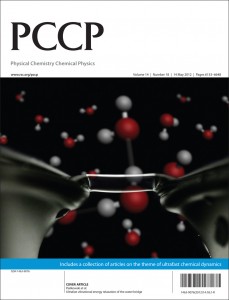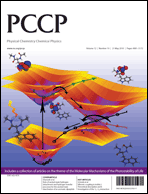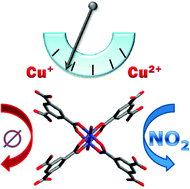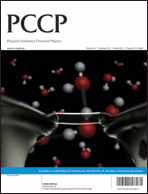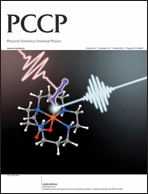This month sees the following articles in PCCP that are in the top ten most accessed in March:
Interfaces of ionic liquids
Frank Endres
Phys. Chem. Chem. Phys., 2012, 14, 5008-5009
DOI: 10.1039/C2CP90031A
Fermi energy level tuning for high performance dye sensitized solar cells using sp 2 selective nitrogen-doped carbon nanotube channels
Ga In Lee, Narayan Chandra Deb Nath, Subrata Sarker, Weon Ho Shin, A. J. Saleh Ahammad, Jeung Ku Kang and Jae-Joon Lee
Phys. Chem. Chem. Phys., 2012, 14, 5255-5259
DOI: 10.1039/C2CP40279C
Proton transfer and polarity changes in ionic liquid–water mixtures: a perspective on hydrogen bonds from ab initio molecular dynamics at the example of 1-ethyl-3-methylimidazolium acetate–water mixtures—Part 1
Martin Brehm, Henry Weber, Alfonso S. Pensado, Annegret Stark and Barbara Kirchner
Phys. Chem. Chem. Phys., 2012, 14, 5030-5044
DOI: 10.1039/C2CP23983C
Solar hydrogen production with semiconductor metal oxides: new directions in experiment and theory
Álvaro Valdés, Jeremie Brillet, Michael Grätzel, Hildur Gudmundsdóttir, Heine A. Hansen, Hannes Jónsson, Peter Klüpfel, Geert-Jan Kroes, Florian Le Formal, Isabela C. Man, Rafael S. Martins, Jens K. Nørskov, Jan Rossmeisl, Kevin Sivula, Aleksandra Vojvodic and Michael Zäch
Phys. Chem. Chem. Phys., 2012, 14, 49-70
DOI: 10.1039/C1CP23212F
Facile preparation of nitrogen-doped graphene as a metal-free catalyst for oxygen reduction reaction
Ziyin Lin, Min-kyu Song, Yong Ding, Yan Liu, Meilin Liu and Ching-ping Wong
Phys. Chem. Chem. Phys., 2012, 14, 3381-3387
DOI: 10.1039/C2CP00032F
Density functional theory for transition metals and transition metal chemistry
Christopher J. Cramer and Donald G. Truhlar
Phys. Chem. Chem. Phys., 2009, 11, 10757-10816
DOI: 10.1039/B907148B
A theoretic insight into the catalytic activity promotion of CeO2 surfaces by Mn doping
Wanglai Cen, Yue Liu, Zhongbiao Wu, Haiqiang Wang and Xiaole Weng
Phys. Chem. Chem. Phys., 2012, 14, 5769-5777
DOI: 10.1039/C2CP00061J
Graphene-based electrochemical energy conversion and storage: fuel cells, supercapacitors and lithium ion batteries
Junbo Hou, Yuyan Shao, Michael W. Ellis, Robert B. Moore and Baolian Yi
Phys. Chem. Chem. Phys., 2011, 13, 15384-15402
DOI: 10.1039/C1CP21915D
Near infrared thieno[3,4-b]pyrazine sensitizers for efficient quasi-solid-state dye-sensitized solar cells
Xuefeng Lu, Gang Zhou, Hong Wang, Quanyou Feng and Zhong-Sheng Wang
Phys. Chem. Chem. Phys., 2012, 14, 4802-4809
DOI: 10.1039/C2CP40441A
Recent developments in the study of ionic liquid interfaces using X-ray photoelectron spectroscopy and potential future directions
Hans-Peter Steinrück
Phys. Chem. Chem. Phys., 2012, 14, 5010-5029
DOI: 10.1039/C2CP24087D
Why not take a look at the articles today and blog your thoughts and comments below.
Fancy submitting an article to PCCP? Then why not submit to us today!
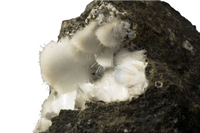 Zeolites are truly fascinating materials, first noted in the 18th century they were recognized for their interesting ability to release steam when heated. Today around 3 million tons of natural zeolite are mined for commercial use each year. Zeolites have found applications in agriculture, construction, heating, refrigeration, nuclear energy, in the petrochemical industry, as detergents and cat litter!
Zeolites are truly fascinating materials, first noted in the 18th century they were recognized for their interesting ability to release steam when heated. Today around 3 million tons of natural zeolite are mined for commercial use each year. Zeolites have found applications in agriculture, construction, heating, refrigeration, nuclear energy, in the petrochemical industry, as detergents and cat litter!











